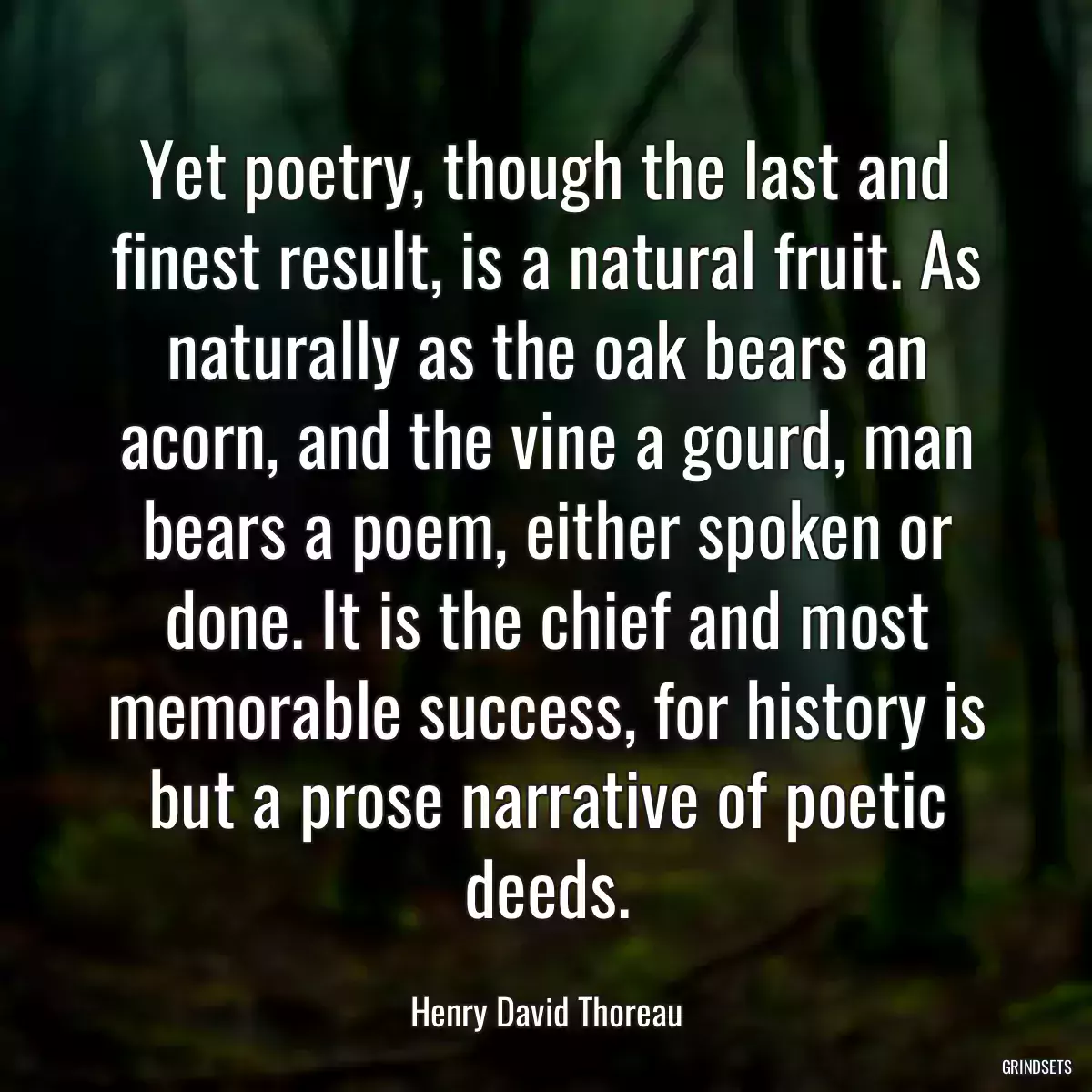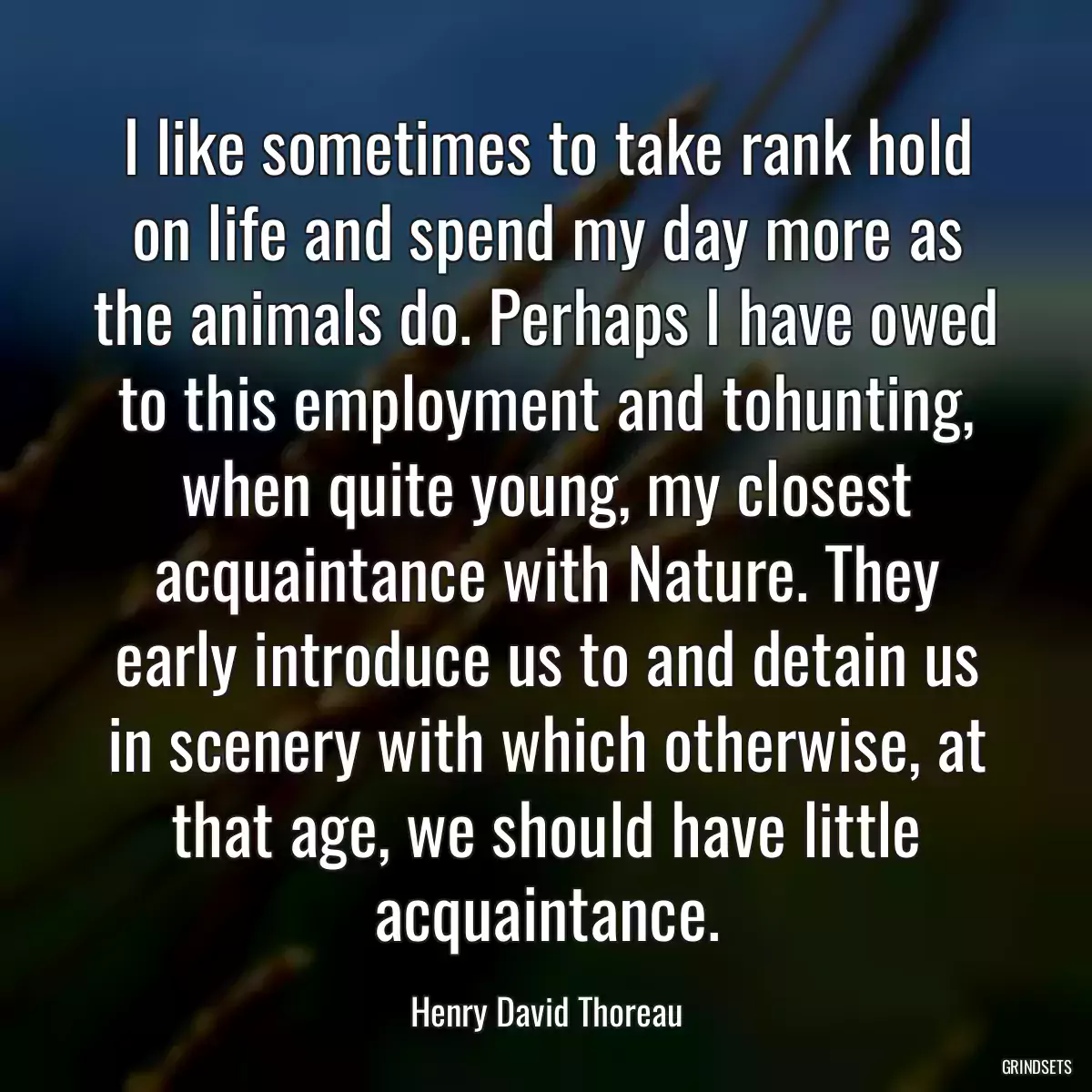
Quotes Henry David Thoreau - page 13
Find dozens of Henry David Thoreau with images to copy and share.

When we consider the weak and nerveless periods of some literary men, who perchance in feet and inches come up to the standard oftheir race, and are not deficient in girth also, we are amazed at the immense sacrifice of thews and sinews. What! these proportions, these bones,--and this their work! Hands which could have felled an ox have hewed this fragile matter which would not have tasked a lady's fingers! Can this be a stalwart man's work, who has a marrow in his back and a tendon Achilles in his heel?
Really to see the sun rise or go down every day, so to relate ourselves to a universal fact, would preserve us sane forever.
As we grow older, we live more coarsely, we relax a little in our disciplines, and, to some extent, cease to obey our finest instincts. But we should be fastidious to the extreme of sanity, disregarding the gibes of those who are more unfortunate than ourselves.
You may also like
It is always singular, but encouraging, to meet with common sense in very old books, as the Heetopades of Veeshnoo Sarma; a playful wisdom which has eyes behind as well as before, and oversees itself. It asserts their health and independence of the experience of later times. This pledge of sanity cannot be spared in a book, that it sometimes pleasantly reflect upon itself.
Men must speak English who can write Sanskrit; they must speak a modern language who write, perchance, an ancient and universal one.
It is remarkable that almost all speakers and writers feel it to be incumbent on them, sooner or later, to prove or acknowledge the personality of God. Some Earl of Bridgewater, thinking it better late than never, has provided for it in his will. It is a sad mistake.
What the essential difference between man and woman is, that they should be thus attracted to one another, no one has satisfactorily answered. Perhaps we must acknowledge the justness of the distinction which assigns to man the sphere of wisdom, and to woman that of love, though neither belongs exclusively to either. Man is continually saying to woman, Why will you not be more wise? Woman is continually saying to man, Why will you not be more loving? It is not in their wills to be wise or to be loving; but, unless each is both wise and loving, there can be neither wisdom nor love.
The life of a good man will hardly improve us more than the life of a freebooter, for the inevitable laws appear as plainly in theinfringement as in the observance, and our lives are sustained by a nearly equal expense of virtue of some kind. The decaying tree, while yet it lives, demands sun, wind, and rain no less than the green one. It secretes sap and performs the functions of health. If we choose, we may study the alburnum only. The gnarled stump has as tender a bud as the sapling.

As naturally as the oak bears an acorn and the vine a gourd, man bears a poem, either spoken or done.
There is reason in the distinction of civil and uncivil. The manners are sometimes so rough a rind that we doubt whether they cover any core or sap-wood at all.
I frequently tramped eight or ten miles through the deepest snow to keep an appointment with a beechtree, or a yellow birch, or an old acquaintance among the pines.
Long enough I had heard of irrelevant things; now at length I was glad to make acquaintance with the light that dwells in rotten wood. Where is all your knowledge gone to? It evaporates completely, for it has no depth.
I often accuse my finest acquaintances of an immense frivolity; for, while there are manners and compliments we do not meet, we donot teach one another the lessons of honesty and sincerity that the brutes do, or of steadiness and solidity that the rocks do. The fault is commonly mutual; however, for we do not habitually demand any more of each other.
I have lately got back to that glorious society called Solitude, where we meet our friends continually, and can imagine the outside world also to be peopled. Yet some of my acquaintance would fain hustle me into the almshouse for the sake of society, as if I were pining for that diet, when I seem to myself a most befriended man, and find constant employment. However, they do not believe a word I say.
This fair homestead has fallen to us, and how little have we done to improve it, how little have we cleared and hedged and ditched! We are too inclined to go hence to a "better land," without lifting a finger, as our farmers are moving to the Ohio soil; but would it not be more heroic and faithful to till and redeem this New England soil of the world?
The Fitchburg Railroad touches the pond about a hundred rods south of where I dwell. I usually go to the village along its causeway, and am, as it were, related to society by this link. The men on the freight trains, who go over the whole length of the road, bow to me as to an old acquaintance, they pass me so often, and apparently they take me for an employee; and so I am. I too would fain be a track-repairer somewhere in the orbit of the earth.
You may also like

I like sometimes to take rank hold on life and spend my day more as the animals do. Perhaps I have owed to this employment and tohunting, when quite young, my closest acquaintance with Nature. They early introduce us to and detain us in scenery with which otherwise, at that age, we should have little acquaintance.
When my hoe tinkled against the stones, that music echoed to the woods and the sky, and was an accompaniment to my labor which yielded an instant and immeasurable crop. It was no longer beans that I hoed, nor I that hoed beans; and I remembered with as much pity as pride, if I remembered at all, my acquaintances who had gone to the city to attend the oratorios.